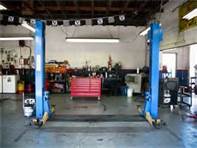7 Steps To Take the Stress Out of Car Repairs
 |
DES MOINES, IA--April 11, 2014: Within the first 120 miles of driving her new car off the lot, Jen Harken was in the repair shop for the first of six visits over the next year. From a loose fuse to a bad fuel pump to a damaged o-ring, the mom-of two, chief carpooler and corporate communications manager, learned some important lessons about what rights she had, and didn't have, when it came to buying a car.
"I learned having a warranty makes a huge difference," says Harken. "Even when a car breaks down that soon – and that often -- you can't just return it." While you can often cancel a purchase within three days, the Federal Trade Commission and state laws are different for items like cars, real estate, insurance and securities – so it pays to research what applies to you ahead of time.
Harken also learned the "Lemon Law" didn't apply to her situation. While each state's Lemon Law varies, the general purpose of the law is to protect you from being stuck with a new vehicle that has a substantial defect and attempts to repair that defect are unsuccessful.
"Sometimes a car is just 'off,'" says Harken. "It's a hassle to juggle schedules and find another way to get everyone where they need to go. It's a lot less stressful if you know what your rights are and work with your dealer to resolve the problem."
If your car, new or used, is in the shop for any reason, and you're concerned you may have problems getting repairs done correctly, keep in mind the following steps to resolve problems.
1. Get the used parts from your repairs. Getting your used parts is a good idea any time you have major work done. If the garage will not give them to you, send a written request and keep a copy. If you still don't receive parts, you are at least able to demonstrate to the court that you asked.
2. Have your car checked by an expert. While it's possible to get a free estimate from a repair shop, you may be better off paying someone to look at the need for repairs thoroughly. If necessary, the mechanic may testify on your behalf in small claims court, or at minimum, may write a letter stating what's needed.
3. Negotiate. With more evidence, you may be able to call and ask the first repair shop to redo the work or discuss a refund. If they agree to take the car back, insist on a written agreement detailing what they'll do and how long it will take. Talk to the mechanic who'll actually work on the car to be sure you both understand what needs to be done. Giving the repair shop a chance to make amends is usually easier to negotiate than getting a refund. Plus, if you need to sue and you refused an option to have them fix the problem, you may have a weaker case.
4. Write a demand letter. If you are still not satisfied, write a formal demand letter that is short, polite and written with the expectation that a judge will read it. (For details download this guidebook from ARAGŪ and see the checklist at the end for what to include in your demand letter.)
5. Consider filing in court. If you still don't get the response you need, file your papers at the small claims or other appropriate court depending on your jurisdiction and the amount in dispute. These will typically be filed with the court clerk's office in the county where the garage is located. If your state or locality has a motor vehicle repair law that the repair shop did not follow, consider asserting a claim or defense based on the violation.
6. Prepare for court. Research your situation further (read car manuals, discuss with a mechanic, etc.) so you can explain to a judge (who is not a mechanic) why the original repairs were substandard.
7. Appearing in court. Be sure you are well organized, have all the letters you've written and received, written warranties, photographs and used parts if they help make your case. If you have a witness to statements made by the garage, bring that person with you to court, or if that's not possible, ask the witness to write a letter explaining what he or she heard.
For more information on finding, selecting and working with an auto mechanic – and increasing the chances you'll get the results you're looking for – download this free Auto Repair Guidebook from ARAG.
For major car repairs – and even minor ones, many consumers also benefit from having legal insurance. Offered by companies like ARAG, legal insurance allows people to contact a credentialed Network Attorney, more easily and affordably than they could on their own. Whether to just check in on the best course of action, or to have an attorney write a letter or appear in court, accessing legal insurance gives people an option to solve otherwise time-consuming and stressful problems.


